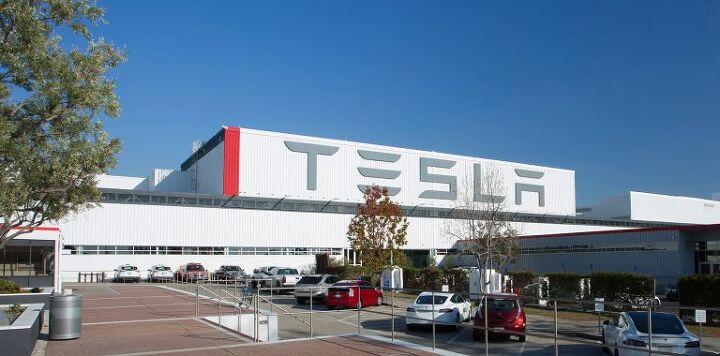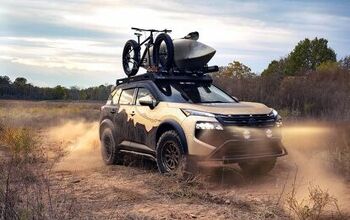Truth in Numbers: Tesla Motors Kind of Lied to Us

Yesterday, we mentioned how Tesla was behind schedule with its everyman Model 3 — delivering only 220 units to the half-million reservation holders since the start of production in late July. While we knew it would get off to a slow start, CEO Elon Musk previously assured the public that production would increase exponentially through the end of the year by way of a “ production hell” trial by fire.
Musk claimed there should be “zero concern” about Tesla achieving a production rate of 10,000 cars a week before the end of next year. But many wondered if that was even possible. Despite Tesla making serious strides to increase production volume this year, we remained dubious that the proposed numbers were even feasible for a fledgeling automaker.
As it turns out, they weren’t — and the company knew it.
In an application for sales tax exemption from the CAEATFA program filed early this year, the California Treasurer revealed that Tesla had production capacity of the Model 3 pegged at 226,563 units per year over a five-year span. But that wasn’t what was being promised by Musk or the rest of Tesla’s executives.
Brought to light by the Daily Kanban, the filing shows quite a disparity between what the automaker told the California Treasurer and what it told its investors. The figure in the tax exemption document doesn’t meet Musk’s 10,000-unit week nor the company’s 5,000-per-week goal for the end of 2017.
Granted, 5,000 units is a nice round number to hang your hat on. So Musk can be forgiven for not explicitly stating the number will be closer to 4,356. But it’s misleading when you take into account the company’s 10,000 unit claim — even if you throw both the Model S and Model X’s expanded production volume into the mix.
At the very least, Tesla should be condemned for being mildly deceptive. It’s either low-balling the data being given to the California State Treasurer’s Office or puffing up product claims for its investors. Either way, it doesn’t look to be genuinely confident that it can hit Musk’s target volume of nearly 1 million vehicles in 2020.
Teething issues with the Model 3 aren’t the issue. We all knew the company has set extremely ambitious production goals for itself in a fairly short timeframe. Falling incredibly short of September’s target of 1,500 cars isn’t a big deal. But it might be worth considering that Tesla is telling two groups entirely different stories.
From the Daily Kanban:
“To understand just how misleading Musk’s statement was, some context and math is necessary. A previous [sales tax exemption] request, reported exclusively by Daily Kanban, revealed that Tesla is expanding annual production of its “Gen2” vehicles (Models S and X) to 195,000 units per year, or about twice current sales levels. Add that to the 226,563 average in the most recent [sales tax exemption] application and you get a total annual production rate of 421,563 units per year for Tesla’s entire product line. Divide that number by 52, and you get a weekly production rate of 8,106 vehicles per week.”
However, we’re still a long way from that becoming a reality. Tesla only delivered a total of 47,077 vehicles through the first half of 2017. Yet the company told the media prior to the January filing that it planned to build 500,000 vehicles in 2018 — a five-fold increase from its current production schedule.
We get that you have to play the hype game to compete in the car-building business. But Tesla might be playing a little too fast and loose when it comes to estimating its production volume.
[Image: Tesla Motors]

A staunch consumer advocate tracking industry trends and regulation. Before joining TTAC, Matt spent a decade working for marketing and research firms based in NYC. Clients included several of the world’s largest automakers, global tire brands, and aftermarket part suppliers. Dissatisfied with the corporate world and resentful of having to wear suits everyday, he pivoted to writing about cars. Since then, that man has become an ardent supporter of the right-to-repair movement, been interviewed on the auto industry by national radio broadcasts, driven more rental cars than anyone ever should, participated in amateur rallying events, and received the requisite minimum training as sanctioned by the SCCA. Handy with a wrench, Matt grew up surrounded by Detroit auto workers and managed to get a pizza delivery job before he was legally eligible. He later found himself driving box trucks through Manhattan, guaranteeing future sympathy for actual truckers. He continues to conduct research pertaining to the automotive sector as an independent contractor and has since moved back to his native Michigan, closer to where the cars are born. A contrarian, Matt claims to prefer understeer — stating that front and all-wheel drive vehicles cater best to his driving style.
More by Matt Posky
Latest Car Reviews
Read moreLatest Product Reviews
Read moreRecent Comments
- Golden2husky The biggest hurdle for us would be the lack of a good charging network for road tripping as we are at the point in our lives that we will be traveling quite a bit. I'd rather pay more for longer range so the cheaper models would probably not make the cut. Improve the charging infrastructure and I'm certainly going to give one a try. This is more important that a lowish entry price IMHO.
- Add Lightness I have nothing against paying more to get quality (think Toyota vs Chryco) but hate all the silly, non-mandated 'stuff' that automakers load onto cars based on what non-gearhead focus groups tell them they need to have in a car. I blame focus groups for automatic everything and double drivetrains (AWD) that really never gets used 98% of the time. The other 2% of the time, one goes looking for a place to need it to rationanalize the purchase.
- Ger65691276 I would never buy an electric car never in my lifetime I will gas is my way of going electric is not green email
- GregLocock Not as my primary vehicle no, although like all the rich people who are currently subsidised by poor people, I'd buy one as a runabout for town.
- Jalop1991 is this anything like a cheap high end German car?


































Comments
Join the conversation
Saw a wild model 3 in person here last weekend... It looks better that I would have thought, but the giant Ipad thing is still goofy. The guy said there are still some software bugs they need to work out but otherwise it's a pretty good car. He does work for SpaceX though.
I tried to care about this story, I really did, but I just don't. This is a car company that came out of nowhere doing things nobody has done. Its just par for the course. Get over it, move on.